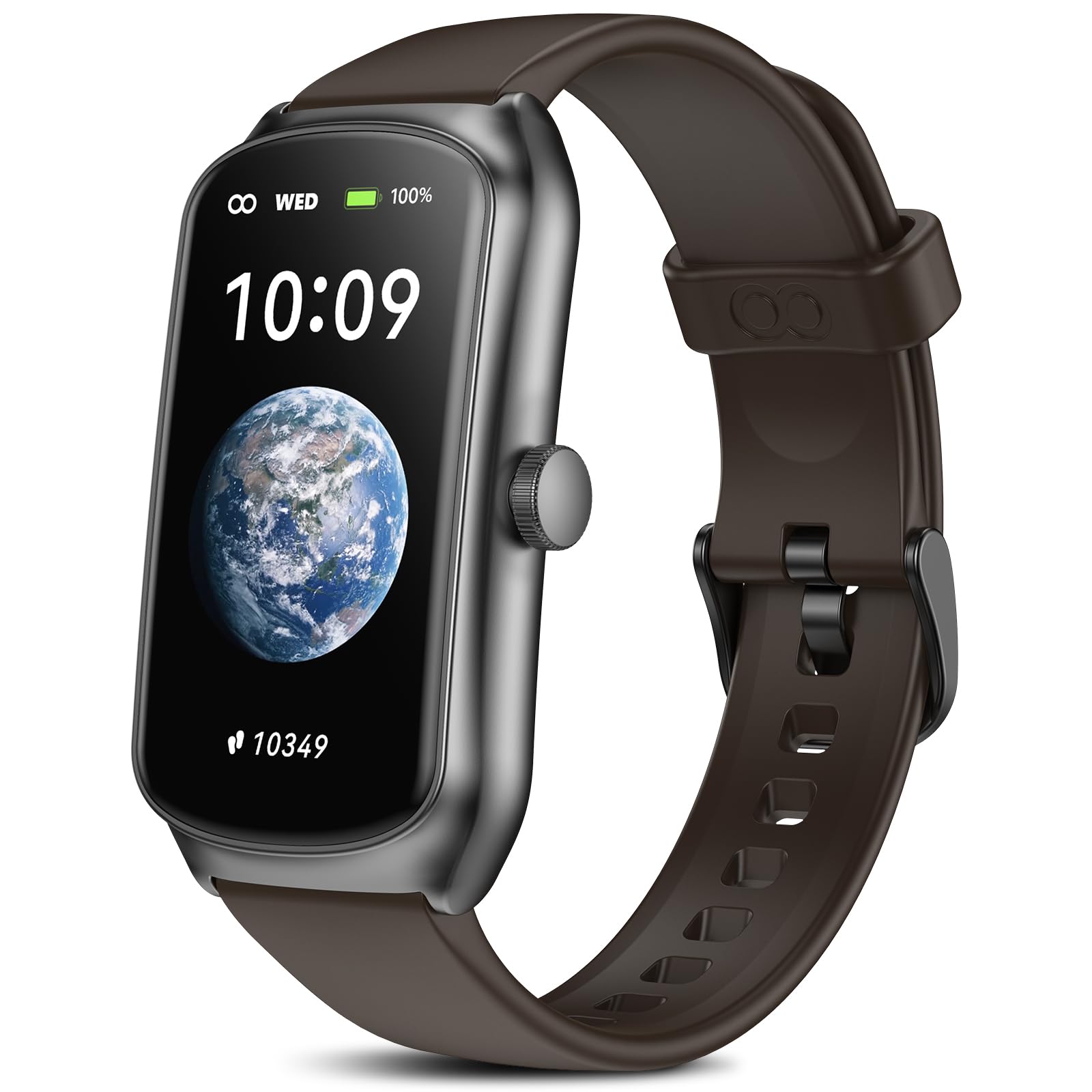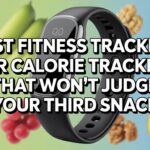Everyone’s obsessed with counting steps—yeah, us too. Fitness trackers are everywhere: on the bus, at the gym, maybe even on your neighbor’s dog. These gadgets tell us how many times we’ve walked past the fridge, or if we’re secretly running a marathon in our sleep.
But let’s be real, choosing a fitness tracker isn’t just about picking your favorite color. Some track your heart rate, some know if you’re swimming, some send more notifications than your group chat. We’ve got to think about battery life, comfort, screen size, and whether we’ll actually want to wear it all day without clashing with our only decent shirt.
Price is a big deal, too. Nobody wants to spend more on a tracker than on the gym membership we keep forgetting about. We hunted for trackers under $300 and focused on features that actually matter for most people. We spent hours digging through reviews and comparing the best options so you don’t have to get your steps running between confusing articles.
Best Fitness Trackers Under $300
We all want to get fit, but our wallets need to stay in shape, too. That’s why we tracked down the best fitness trackers under $300—so we can count our steps without our bank account running on empty.
Let’s check out what made the list before our motivation bails.
Fitbit Inspire 3
When our motivation hits rock bottom after leg day, the Fitbit Inspire 3 jumps in to track our progress—and maybe (just maybe) guilt us into doing cardio.
Pros
- Slim, light, and so comfy we forget it’s there—until it buzzes at us to stand up
- Tracks sleep, stress, and heart rate, so we can pretend we’re basically doctors
- Battery lasts up to 10 days, or almost two work weeks of excuses
Cons
- Needs a phone for GPS—so “unplugged runs” are just a dream
- Premium subscription for the fancy stuff (because nothing’s ever just included)
- Screen is tiny—our thumbs feel like giant sausages
When the Inspire 3 vibrates to remind us we’ve been sitting too long, we feel a little smug. The band’s comfortable enough that we barely notice it, unless it’s cheerfully telling us to get moving or pointing out our lack of sleep after another late-night binge-watch.
We like the heart rate tracking and daily health score. It helps us feel more in control, even if it’s just another gadget bossing us around.
Sleep tracking is weirdly satisfying. We wake up and check our score, comparing stats like we’re pro athletes—except, you know, we’re not. Stress management features are nice, especially the guided breathing. Deep breathing beats yelling at our inbox any day.
The color screen is handy and notifications keep us in the loop, but we wish GPS was built in. Sometimes it seems like our wrists are smarter than we are. If we want extra insights, we’ll have to cough up for Fitbit Premium.
Honestly, Fitbit Inspire 3 is a fun little tracker that keeps us moving—and sometimes laughing at ourselves.
Garmin vívosmart 5
If you want a tracker that keeps tabs on everything but doesn’t require a PhD to use, the vívosmart 5 is a smart pick—assuming you’re cool with a few quirks.
Pros
- Super comfortable band, even after all-day wear
- Nice mix of health tracking features, including sleep and stress
- Battery lasts a week—no charge anxiety
Cons
- Step counter gets a bit optimistic on lazy days
- App setup tests your patience (and maybe your snack supply)
- Display isn’t exactly blindingly bright
Most of us want a tracker that looks good and doesn’t nag constantly. We slipped on the Garmin vívosmart 5 and almost forgot it was there—light enough to ignore, smart enough to buzz when we’re about to miss our third meeting.
We liked how it measured heart rate, stress, and even our “Body Battery.” That sounds made up, but it’s actually useful.
During workouts, it nailed our runs and yoga sessions, though it counted a few too many steps when we flailed around in the kitchen. The battery easily lasted a week, so we didn’t have to babysit a charger.
Setting it up through the app took a deep breath and maybe a pep talk, but once it’s ready, everything clicks. For those with small wrists, it fits comfortably and doesn’t look like a mini tablet strapped on.
Our main gripe is the screen—it’s big enough for the basics, but could use more brightness. Still, if you want a tracker from a trusted brand and don’t want to spend a fortune, the vívosmart 5 holds its own—no stress.
Fitbit Charge 5
Buy the Fitbit Charge 5 if you want a solid tracker that helps you fake having your life together.
Pros
- Daily Readiness Score gives us an excuse for skipping leg day
- Built-in GPS helps us get lost with confidence
- Comes with six months of Premium, so we feel fancy
Cons
- Battery gets tired after a year or so
- Some features are behind a paywall—classic move
- Needs a Google account now, so goodbye anonymous step-counting
Charge 5 fits comfortably and starts judging our sleep as we eat leftover pizza in bed. The color touchscreen is a big upgrade—it’s easy to check our progress or ignore our lazy streak in broad daylight.
It tracks steps, heart rate, and sleep like a champ. We get more info about our heart than we did at our last doctor’s visit (but with less awkward small talk). Notifications for texts and calls mean we can “forget” our phones at our desk and still not miss anything—except maybe that call from Aunt Linda.
Daily Readiness Score and stress tools actually help us decide if a post-lunch walk is a good idea or if the couch wins. Built-in GPS means no dragging our phones on a jog, and after a week, we get weirdly competitive with ourselves.
Just be ready for a battery that, like us, might not go the distance after a couple of years.
Fitbit Charge 6
If you like your trackers practical, sleek, and just a bit too smart, this is a definite yes.
Pros
- Built-in GPS saves us from wandering in circles—finally, proof we walk in circles
- Seven-day battery life means less charging, more pretending we’re athletes
- Wallet and Maps on the wrist make us feel like secret agents at the grocery store
Cons
- Band feels more like a silicone bracelet than jewelry—style points lost
- Switching to a Google account was about as fun as assembling IKEA furniture
- Blood oxygen tracking is more confusing than helpful
The Fitbit Charge 6 actually looks pretty stylish, especially with that shiny gold case. We slapped it on and found activity tracking reliable and easy.
Built-in GPS came through when we decided to “run”—and by run, we mean walk briskly to the nearest coffee shop. We enjoyed controlling music and maps from the watch, especially when our phones were lost somewhere in the couch cushions (again).
The battery lasted a full week, which is a rare win for us. And those friendly reminders to get off the couch? Sometimes, they’re more motivating than our gym buddy.
The strap feels like a rubber band, so if you want arm candy, you’ll want to swap it out. Migrating from Fitbit to Google felt like signing up for witness protection. Also, if you’re obsessed with blood oxygen stats, be prepared to be confused—they’re pretty vague.
Overall, Fitbit Charge 6 lands in that sweet spot between helpful features and style, with just enough tech frustration to keep it interesting.
Fitbit Charge 3
If you want a fitness tracker that doesn’t demand a loan or your firstborn, the Charge 3 will keep you in check without emptying your wallet.
Pros
- Tracks heart rate day and night, so it knows our secrets
- Battery life can last a week unless we press every button nonstop
- Waterproof for all our unplanned run-ins with rain or kitchen sinks
Cons
- Display is tough to read in bright sunlight
- Lacks built-in GPS, so our phones still come along for every workout
- Missing all the fancy widgets of pricier models
Using the Charge 3 feels like having a low-key coach who mostly minds its own business but occasionally nags us to move. The real-time stats and multiple exercise modes help us pretend we know what we’re doing, whether that’s running, cycling, swimming, or some version of yoga that mostly involves not falling over.
Sleep tracking goes beyond counting sheep and gives us a look at our light, deep, and REM sleep. Now we know exactly when we stayed up too late watching TV.
The battery life surprised us; charging once a week is almost too convenient, unless we get carried away with notifications or workout timers.
There are some quirks—the screen is a little shy in the sun, and since it’s missing built-in GPS, our phones tag along like that one overly attached friend. Even so, for a tracker under $300, Charge 3 gets most things right. If you want fitness motivation with a side of stats and forgettable tan lines, it’s tough to beat.
Fitbit Charge 4
If you want a tracker that won’t break the bank but still keeps tabs on just about everything, this one’s a smart pick.
Pros
- GPS is built right in, so you can finally ditch your phone on runs (your pockets will thank you).
- The battery lasts for days—even if you forget to charge, it just keeps going.
- Swimproof, so you don’t need to worry about rain or clumsy dishwashing.
Cons
- The charging cable loves to disappear right when you need it.
- Some features only matter if you’re actually working out (guilty).
- When the battery finally dies, waking it back up takes forever.
When I tried the Fitbit Charge 4, the slim, lightweight feel stood out right away.
I took it for a jog—well, more like a brisk walk—and the GPS let me leave my phone at home for once.
The buzz when I hit my target heart rate felt weirdly motivating, almost as good as that post-workout coffee I promised myself.
Sleep tracking changed the game for anyone who wakes up tired and wonders why.
I checked my sleep score every morning and finally had some data to back up that extra cup of coffee.
Of course, it’s not perfect.
I lose that tiny charging cable more than I’d like to admit.
And I’m still working on those Active Zone Minutes; running for the ice cream truck has to count, right?
But for under $300, it’s pretty hard to complain.
Fitbit Inspire 3
If you want a fitness tracker that actually keeps up with your real life (and your couch-napping), this one does the trick.
Pros
- Tracks steps, sleep, and heart rate without making you study the manual.
- The battery just doesn’t quit—no daily charging drama.
- Slim enough for even the most wild gym flailing.
Cons
- The screen is tiny, so prepare to squint sometimes.
- No built-in GPS, so getting lost on a jog is still on you.
- The app nags you to move like a persistent parent.
Let’s be honest—sometimes, fitness goals take a back seat for a few days.
The Inspire 3 doesn’t judge, quietly logging your steps while you debate if ice cream counts as dairy.
It’s so slim, you’ll barely notice it, even when you’re failing at jumping jacks.
I found the sleep tracking surprisingly helpful.
It shows exactly how restless you were at 3 a.m. (usually while thinking about breakfast).
The gentle move reminders are effective, though maybe just a little too eager.
The battery lasts longer than my last attempt at a low-carb diet, which is honestly a relief.
Syncing with the Fitbit app is easy, and while it won’t replace your phone, you do get handy notifications without any fuss.
If you want a no-fuss way to track daily activity and don’t mind the small screen or occasional guilt trip, the Fitbit Inspire 3 makes fitness feel more like a nudge than a chore.
AKUMAKA Health Tracker
If you want a tracker that does plenty without a bright screen shouting at you all day, this is the one.
Pros
- No subscription fees—no sneaky surprises.
- The app is easy and works on both Android and iPhone.
- The battery outlasts my Monday motivation.
Cons
- No display, so you can’t sneak peeks mid-workout.
- Vibration reminders might be too subtle if you’re distracted.
- Minimalist look, so it won’t double as flashy tech jewelry.
The AKUMAKA Health Tracker surprised me by doing so much while staying almost invisible on my wrist.
Pairing it to my phone took no effort, and the app is actually free—no hidden paywalls.
It tracked my steps, workouts, and even my stress (which spiked every time an email landed).
Even with no screen, it handled health monitoring like a pro, checking heart rate, blood pressure, and more.
The vibrating notifications are gentle—great for subtlety, though I did miss a buzz or two during a podcast.
Family sharing worked easily, and nobody needed a tech degree to figure it out.
It doesn’t try to be flashy or compete with your phone’s display, and honestly, that’s a plus if you just want to move, track, and forget.
The battery lasted almost two weeks on one charge, which is about 13 days longer than my last fitness burst.
If you care more about value than screen-time, this tracker fits the bill.
Anyloop Fitness Tracker
If you want almost every fitness feature without emptying your wallet, this tracker nails it (but don’t expect it to survive a deep-sea adventure).
Pros
- Battery life lasts longer than some relationships.
- Tracks tons of sports, including swimming and table tennis.
- Lets you read messages and reject calls on the sly.
Cons
- No built-in GPS, so don’t count on it for directions.
- Sleep data can be a bit mysterious.
- Strap sizing can be picky, especially for bigger wrists.
The Anyloop Fitness Tracker surprised me by actually lasting over a week without begging for a charge.
I tracked everything from frantic step-counting to a heroic swim (it logs pool laps and strokes, making me feel like Michael Phelps even if I’m not).
The interface is simple, so I didn’t have to dig through menus just to check calories burned chasing the ice cream truck.
Anyloop’s message and call alerts are super handy during meetings.
It vibrates, shows who’s calling, and lets me ignore my boss with a flick of the wrist—very satisfying.
Sports modes are plentiful; if you can sweat doing it, this tracker probably tracks it.
Each feature feels built for people who want to move more and fiddle less.
There’s no GPS onboard, so if you’re running outside, you’ll need your phone for maps.
Sleep tracking isn’t perfect, but it’s kind of fun seeing how little rest you get after a Netflix binge.
The strap fits my average wrists well, but if your wrists are on the beefier side, it might feel snug.
For the price, I’m fine with these quirks—this tracker definitely punches above its weight (though maybe not on arm day).
Fitbit Charge 4
If you want a fitness tracker that’s easy to use, feather-light, and affordable, this one’s a solid pick—as long as you don’t expect it to survive a wrestling match with your furniture.
Pros
- Super comfortable for all-day wear—even if you forget it’s there.
- Built-in GPS means you can leave your phone at home on runs.
- The battery keeps going for days, so you’re not chained to a charger.
Cons
- The display plays hide-and-seek in bright sunlight.
- The strap sometimes wants to escape and go solo.
- If you want tons of fancy extras, you might feel left out.
When I first strapped on the Fitbit Charge 4, it felt light and didn’t dig into my wrist, which is a relief—nobody wants a rash after a workout.
The built-in GPS lets me jog without my phone, and I get to check my pace and route later.
Sleep tracking gave me a reality check about my love for the snooze button.
The display gets shy in sunlight, so checking stats at noon means squinting.
The band sometimes tries to retire early, so treat it gently.
If you want a straightforward fitness band for tracking and basic notifications, this is a handy everyday pick.
But if you crave extra features or need a screen that’s always bright, this one might leave you a bit in the dark.
Buying Guide
Picking a fitness tracker under $300 feels a bit like wandering the cereal aisle—so many options, and now I’m craving breakfast. Honestly, nobody wants to read every label, so let’s just focus on the stuff that really matters.
Here’s what to keep an eye out for:
- Battery Life: Longer battery means you won’t have to hunt for the charger every other night.
- Display: If it’s hard to read, it’ll probably just end up in a drawer.
- Water Resistance: Sweat or swim? Then this feature’s a lifesaver.
- Sensors: Heart rate, step counting, sleep tracking—grab what you’ll actually use.
- Comfort: If it scratches or pinches, forget it. Life’s too short.
Feature Checklist
| Feature | Why It Matters |
|---|---|
| Step Tracking | Counts your daily glory laps |
| Heart-Rate Sensor | Keeps you in the safe zone |
| Sleep Tracking | Explains those tired mornings |
| GPS | Makes sure you don’t get lost |
| App Support | Helps you stay motivated |
Stick with features that fit your routine. If your biggest workout is the walk to the fridge, maybe skip GPS. Runners and swimmers? You’ll want water resistance and reliable tracking.
Always check if the band adjusts easily. You want a tracker that fits you—not your neighbor’s pet ferret, right?
Look for displays that won’t leave you squinting, and pick interfaces that won’t test your patience before coffee. Simple usually wins.
- Why is my fitness tracker not holding a charge? Your Lazy Battery Might Need a Pep Talk - February 9, 2026
- How to use Bluetooth headphones with a treadmill Without Accidentally Inventing a New Dance Move - February 8, 2026
- Fitbit Battery Life Comparison: Which Tracker Won’t Abandon You First? - February 8, 2026
















